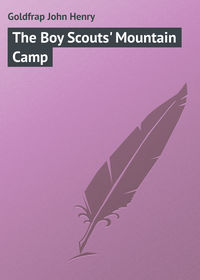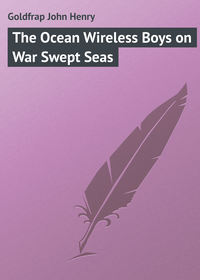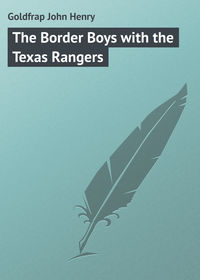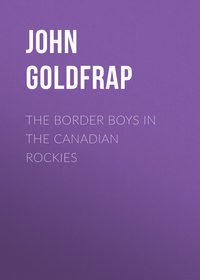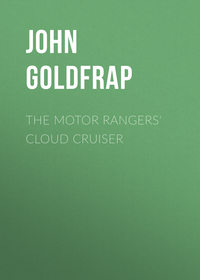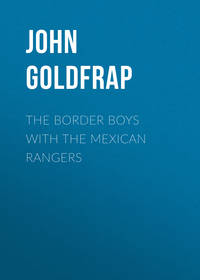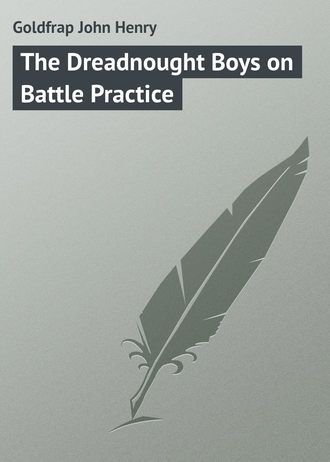 полная версия
полная версияThe Dreadnought Boys on Battle Practice
"I guess you don't know much about Noo Yawk," he said in a sneering tone, "or you'd have known that in the Subway it's 'first come, first served.'"
"Is that so?" inquired Ned, keeping down his anger, while Herc was dancing about in the narrow space he could find in the aisle of the crowded car. The red-headed lad was biting his nails and scratching his head in a manner that boded a storm as surely as black clouds portend thunder.
"That being the case," Ned went on in a cool voice, "it's about time that the Subway learned a few manners. We gave those seats up for those two ladies, and not for you. Are you going to vacate them?"
"Aw, run along and roll your hoop!" sneered the younger newspaper reader, with an affectation of great languor. "You drunken sailors make me tired."
A brown hand shot out as the words left his lips, and the beefy one found himself propelled by the shoulder into the center of the car faster than he had had occasion to move for a long time.
At the same instant Herc, to his huge delight, perceived the signal for action and sailed in on his man. In another second the two beefy ones, dazed by the suddenness of it all, stood side by side in the center of the car, while Ned courteously aided the two ladies to the seats from which the interlopers had been so suddenly wrenched.
"This is an outrage!" bellowed the red-faced men in concert, as they found their voices. "Such a thing has never happened before."
"That's a pity," observed Ned contemptuously, while the delighted Herc whispered in a stage undertone:
"Mine came out like a soft, white worm out of a hickory nut."
"Conductor! conductor!" howled the man to whom Ned had given such a rough and ready lesson in manners, "come here and do your duty. We've been assaulted."
The conductor pushed his way through the crowded aisle, assuming an air of great importance.
"What's all this? What's all this?" he shouted.
"These two rowdy sailors deprived us of our seats," sputtered one of the red-faced men.
"Did you fellows do what he says?" demanded the conductor importantly.
"Sure they did. They pulled the gentlemen right out of them," piped up a voice in the background of the crowd – that of the ferret-faced youth.
"Gentlemen!" snorted Herc. "We'd call 'em hogs up our way!"
"We got up to give our seats to those two ladies, and are very sorry to have caused them this embarrassment," volunteered Ned. "But to see these two overfed fellows slip into the seats before we had hardly risen from them got our dander riz, and we undertook to put them out."
"Conductor, you will call a special policeman at the next station," shouted the man that Ned had hauled to his feet. "I'll make a charge against these desperate ruffians. They need a lesson."
Ned and Herc exchanged alarmed glances.
It might ruin their naval careers if, on the eve of joining their ship, they were to undergo the disgrace of an arrest.
"Better think it over," advised the conductor, who seemed disposed to make peace, and as he slipped by the boys, to regain his platform as the train slackened speed, he whispered:
"You'd best make a sneak, boys; that fellow is Dave Pulsifer, the big gun man, and the other's his brother. He's got lots of influence, and he means to make trouble for you."
Little as either of the Dreadnought Boys relished the idea of running away from trouble, yet the advice seemed good. They both knew enough of the law's delays to realize that, in the event of their being arrested on the red-faced man's charge, they would be liable to be held for some time before they could have chance of explaining the circumstances of the case to a magistrate.
As the train rolled into the Seventy-second Street station, therefore, they adroitly slipped by their friend, the conductor, and, as soon as he opened the door, shot out onto the platform.
The red-faced men, crying loudly for a special policeman, were in the act of following them, when – quite by accident, it seemed – the conductor's foot got in the way, and the first of the pair of worthies fell headlong over it, and his companion, who was pressing hard on his heels, piled on top of him.
By the time they had extricated themselves, during which period the crowd of passengers behind them, who were also anxious to alight, went almost crazy at having to wait a few seconds, the two lads were far down the sidewalks of Seventy-second Street. After a few minutes' brisk walk they reached the snow-covered slopes of Riverside Drive.
"Pulsifer! I know that name," Ned mused, as they hurried along. "I have it!" he exclaimed suddenly. "He's Dave Pulsifer, of Pulsifer Bros., the fellows who make guns in America and sell them to foreign governments."
"I'll bet those two were the brothers, then," suggested Herc. "They looked like two ugly pups of the same homely litter."
The boys gave the matter little more thought, though had they realized how intimately the Pulsifers were to be associated with their further career, they might have considered their encounter more seriously.
"Look, Herc, look!" cried Ned, as they came in sight of the river.
From the slight eminence on which they stood, the boys commanded a magnificent spectacle.
Up and down the majestic stream, as far as the eye could reach, the grim, slaty-hued forms of Uncle Sam's sea bulldogs swung at anchor.
From the funnels of some smoke was lazily floating, while others lay like sleeping monsters on the surface of the dark river.
Looking northward, the boys saw only a maze of cage masts – looking not unlike narrow waste-paper baskets turned upside down – and great dark hulls. Here and there a gaily-colored bit of bunting, which as yet meant little to the boys, fluttered from a masthead or from the signal halliards. Between the ships and the shore constantly darted light gasoline boats, or swift launches with big gray hoods over them.
"Just think, Herc, we are a part of all that!" breathed Ned reverently almost, indicating the formidable array of fighting craft with a wave of his hand.
"Gee! I feel about as big as an ant," whispered Herc, even his irrepressible nature overawed at the sight. "How in the world are we – little, insignificant specks – ever going to distinguish ourselves in all that big array of fighting ships and fighting men?"
"We must do our best, Herc," rejoined Ned simply. "And now let's be getting down to that landing place. I think I see some man-o'-war launches landing there. Maybe we will be lucky enough to find one of the Manhattan's boats."
As they started down an inclined road which led through the park and across the railroad tracks at its foot, they were accosted by a hearty voice just astern of them.
"Hullo, there, shipmates!" it hailed. "Where away?"
The Dreadnought Boys wheeled, and found themselves facing an elderly man, somewhat inclined to stoutness, but whose grizzled and weather-beaten face bore the true trademarks of an old man-o'-war Jack upon it.
"Why, you're from the Manhattan!" cried Ned, as his eyes fell on the other's name band, on which the name of the new Dreadnought was embroidered in gilt thread.
"Aye, aye, my hearties," was the rejoinder in a voice cracked with much shouting in heavy weather in all climes, "and you are a pair of rookies – land-lubbers, eh?"
"Well, I guess you might call us that," responded Ned, not best pleased at this free and easy mode of address, but judging it best to be as amiable as possible. "Can you tell us how to get aboard the Manhattan? We've just left the Naval Training School and are appointed to her."
"Get your rating?"
"Sure – ordinary seamen."
"That's good. Come on with me, boys, and I'll put you aboard ship shape and comfortable. It's a cold day when old Tom Marlin can't look out for a pair of greenies."
Piloted by their companion, the two boys soon arrived at the landing place, which was already crowded with sailors whose shore leave had expired.
"Which is the Manhattan?" asked Sam, gazing with eyes that were still awestruck at the immense vessels that lay out in the river and appeared several sizes too large for their mooring places.
"Right yonder, Bricktop," rejoined old Tom, pointing off to a vessel which, large as were the other battleships, seemed by her huge size almost to dwarf them. "That's the old hooker. The last output of your old Uncle Sam. Right in the next berth to her is the Idaho."
"What's that red flag, with a black ball in the center, floating from the Idaho's main?" inquired Ned, much interested.
"That? Oh, that's the meat-ball!" laughed old Tom.
"The meat-ball?" echoed the boys, much astonished.
"A sort of dinner flag, I suppose?" asked Herc, who was beginning to feel hungry.
"Not much, my lad," laughed the old sailor. "That's the gunnery pennant for the vessel making the best score at the targets. The Idaho won that off the Virginia capes on our last battle practice cruise. All the fleet's after it now, but if we have our way, the old Manhattan will be flying it after we get through peppering the marks off Guantanamo."
Each of the Dreadnought Boys found himself making up his mind, as old Tom spoke, that if it depended on them, the Manhattan would be the battleship to fly the coveted "meat-ball" when next the fleet made port.
CHAPTER VIII.
HERC TAKES A COLD BATH
A few minutes after the boys' arrival at the landing, a launch with a lead-covered hood was seen approaching, towing three large ship's boats behind it. The latter were crowded with jackies coming ashore.
A gilt "M." on the bow of the launch proclaimed it to be from the Manhattan, and Herc made a dive for the float as the "steamer" puffed up to the landing stage.
"Come on, Ned!" he cried. "Whoop! Here's where we join the ship! Bang! Big guns! Blow 'em up! Hurray!"
But to Herc's surprise, as he made for the inclined runway leading to the float, he was met by the menacing muzzle of a rifle.
The weapon was held by a marine – "soldier and sailor too" – behind whom stood the natty middie in charge of the float.
"Stand back!" ordered the marine sternly.
Herc regarded the leveled rifle with some apprehension and gave way a few steps to the rear.
"Don't you know enough not to try to embark till the order is given?" asked Ned, as the young midshipman scowled at the red-headed youth as if the latter had committed some heinous crime.
"Why, the boats are made to get into, aren't they?" protested Herc. "And who is that fellow in the funny uniform, anyhow?"
"That's a marine," laughed Ned. "He's on sentry duty."
"Oh, so he's a marine, eh?" rejoined Herc, regarding the sentry with much disapproval. "One of those sea soldiers – a sort of half-and-half fellow."
Further comment on Herc's part was cut short by the outpouring of the laughing, shouting jackies who were coming ashore on leave. They poured up the narrow gangway in a seemingly never-ending stream.
"There'll be no one left to man the ships," gasped Herc, as the ranks of light-hearted shore-leave men poured past. Some of them carried suitcases, and were evidently going ashore to bid a last good-by to their friends. Others, whose folks probably resided in distant cities, were going ashore for a last look at New York.
"Those fellows will all have to be on board by midnight," explained old Tom to the boys. "They're going to crowd all they can into the few hours they'll have ashore."
"Then we are to sail soon?" inquired Ned, his heart beating high and his eyes sparkling.
"Before eight bells to-morrow morning we'll be in the Narrows," rejoined the old bluejacket.
"That's the stuff!" cried Ned, gazing at the ranks of bronzed, healthy faces which were still passing by.
"Want action, eh?" laughed old Tom. "Well, lads, you'll get it before you are many hours older; and remember, my lad, that it isn't all fun aboard a man-o'-war, and always bear in mind one thing – do what you're told without grumbling. Tee-total abstinence, when it comes to making remarks about what you are told to do in Uncle Sam's navy."
"Say, Ned," whispered Herc.
"What?" asked Ned, still engrossed in the animated scene before him, and in the formidable background formed by the motionless war machines.
"Well, did you hear what he said?"
"Yes, why?"
"Oh, nothing; only it looks as if we had bitten off more than we could chew, that's all."
"What do you mean?"
"That I didn't like that part about 'not grumbling whatever we are told to do.' It looks as if we might have some pretty tough chores set us."
"I guess we shall have all sorts of chores," laughed Ned, as he regarded Herc's rueful face; "but we didn't enlist to look pretty and pose becomingly in our uniforms. We're in the United States navy for four years, and whatever happens, we've got to stick to it."
The lads' conversation had been carried on in an undertone, but Ned had unconsciously raised his voice as he spoke the last words.
"That's the talk, shipmate," said old Tom, regarding him approvingly. "I never heard a boy talking like that yet who didn't come out of the big end of the horn before he'd served out his enlistment. The navy's the finest place in the world for boys of your cut, but it's no place for shirkers."
The old man regarded Herc as he spoke, and the carroty-headed boy's eyes fell under the tar's keen, half-humorous gaze. To tell the truth, Herc was beginning to half regret that he had enlisted at all. The prospect of four years' service at the hard tasks at which the old sailor had hinted did not best please him; but Herc knew better than to make any complaint to Ned. The other lad, however, had noticed his companion's downcast looks and rallied him on them.
"Come, Herc, cheer up!" he said heartily. "We're like young bears – all our troubles before us; but they'll lick us into shape, never fear."
"Oh, crickey! there you go again," groaned Herc.
"Go again – what?" demanded Ned, puzzled.
"Why, talking about 'licking us.' Do they still lick fellows in the navy, Mr. Tom?"
"No, my lad; the cat-o'-nine-tails was abolished in Uncle Sam's ships years ago," responded the old man, with a twinkle; "but we've still got the brig."
"The brig – that's a kind of a ship, isn't it?" inquired Ned.
"Not as I knows of," grinned old Tom; "but teetotal abstinence is the word when it comes to the brig, my lads. I hope you'll never form its acquaintance."
"Attention!"
The young midshipman shouted the order.
The Dreadnought Boys straightened up, as did all the other tars. The landing parties had by this time all dispersed and were straggling up the hill, playing all manner of tricks on each other, more like a lot of happy boys just out of school than anything else.
"Now, what's that young whipper-snapper going to do?" whispered Herc.
"Hush!" rejoined Ned. "I expect we are going to get an order."
He was right.
Orders were given for the men to board the boats in a quiet, orderly manner.
"Keep close by me," cautioned old Tom, "and never mind the joshing you are going to get."
Ned had noticed for the past few minutes that the sailors assembled on the wharf had been eyeing them curiously, and that some of them had been whispering together.
"Why, what's the trouble?" asked Herc.
"I expect the boys will give you a bit of a hazing," replied old Tom. "But take it all in good part, and you'll soon be shipmates with all of them."
The old sailor's prophecy came true.
The midshipman who had been on duty at the float was relieved by another of his rank, and the first then took his place in the "steamer" which was to tow the boats full of jackies. As he sat in the stern sheets of the power craft, he could not see readily what was going on in the boats, and perhaps made it a point not to be too observant.
Ned and Herc found themselves in the second boat, and as they had become separated from old Tom in the rush to board the craft, they had now no mentor to advise them, and felt curiously alone among the laughing, joking bluejackets that crowded the boats to the gunwales.
"I see the old man's ordered his winter's supply of kindling!" came in a loud stage whisper from the boat in which the two lads were seated.
The "old man" always refers to the commander of a man-of-war, in the parlance of the jackies.
"Say, Bill, your thatch is on fire!" laughed another.
Poor Herc felt his cheeks turn as red as his unlucky hair under the running fire of banter which, there was no room to doubt, was intended for him.
"Might be a good thing to call fire stations," grinned another. "I don't much like the idea of sailing on a battleship with so much combustible stuff aboard."
"Like being shipmates with a red-hot stove," put in another before-the-mast humorist.
"Keep cool, Herc," whispered Ned, who was beginning to dread an outburst on the part of his impulsive companion.
Unfortunately his whisper was overheard, and a shout went up from those nearest the two boys.
"That's right! 'Keep cool, Herc!'" they mimicked. "Don't get afire, mate, or we may have to duck you."
"I reckon he must have belonged to the village fire department," put in another.
"I'll bet they practiced putting out fires on his head," came another voice.
It was more than flesh and blood could bear.
Herc arose angrily to his feet, and was beginning a speech full of hot resentment, when the boat, which was by this time under way, gave a sudden lurch.
Herc had been unmindful of the fact that a fresh wind blowing up the North River kicks up quite a sea, and in a second he was sprawling on the bottom of the boat, with a perfect tempest of laughter ringing in his burning ears.
But, as he fell, Herc's heavy form careened against a seaman who was standing upright, scanning the vessel they were approaching. Down crashed the two, with Herc on top. When they rose the nose of the seaman who had fallen under Here's bulky person was bloody, and his eyes inflamed with rage.
"You hayseed-eating swab," he growled, "look here – blood all over my blouse. Now I've got to clean it or get a call down."
"I'm very sorry," said Herc penitently, "I didn't do it on purpose."
"You're a liar, and I'll trim you for it before long."
Herc recollected Ned's advice, and bottled his rage. In a cutting voice, however, he rejoined:
"At the Training School they told us that most sailors were gentlemen. I guess they were dead wrong."
"Fire's out!" yelled somebody; but as, by this time, they were almost alongside the towering, slate-colored sides of the Manhattan, a quick cry of "Hush!" ran through the boat, and the Dreadnought Boys, for the present, escaped further trials of their tempers.
"Aren't we going to board the ship?" asked Herc, as the launch approached the Manhattan, which was swung up-stream, with the tide.
"Of course," replied Ned.
Both lads spoke in an undertone, so as not to run the risk of incurring a rebuke or the bringing down of further teasing on their heads.
"But there is a gangway hanging over the side right there," objected Herc, pointing to a substantial stairway leading from the stern structure of the big war vessel to the water's edge.
"Why, you lubber," laughed Ned, "that's the officer's landing place. We are not allowed to land on the starboard side. We jackies have to go round to the port side of the ship."
"Humph!" remarked Herc, in whose mind a very distinct feeling that he should not like the navy was beginning to take shape.
In a few minutes the launch drew up at the officer's gangway, and the young midshipman leaped in an agile manner onto it. The launch then continued round the steep bow of the Manhattan, which towered like a mighty cliff of gray steel above the boys' heads. It steamed on till it arrived beneath a number of "Jacob's ladders" dangling from booms projecting several feet outward from the vessel's side.
"How on earth do we get aboard?" said Herc.
"Climb up those ladders," rejoined Ned.
"What, those swinging things?"
"That's right."
"What then?"
"Then we run along those booms till we are on board the ship."
"No, thank you."
Herc looked apprehensively at the swinging ladders up which the jackies from the first boat were already beginning to swarm like monkeys, nimbly scampering along the booms when they reached the top. They steadied themselves on the lofty perches by light hand-lines rigged for the purpose.
"What do you mean? Surely you are not getting scared?"
"No, not scared," replied Herc. "But what's a fellow want to come into the navy for if he can make a living walking a tight rope?"
"Come on, you two rookies!" shouted a voice at this moment. "Let's see how you can manage a Jacob's ladder."
There was a taunting note in the words that made Ned wheel angrily. He saw facing him, with an ugly leer on his countenance, the hulking-looking man, whose arm stripes denoted that he was serving his second enlistment, with whom Herc had already had the recorded passage-at-arms. Then and there Ned felt that this fellow and himself were not destined to make good shipmates. He also determined, however, not to let any of the jackies see that there was an instant's hesitation in his mind about taking the perilous-looking climb.
"Come on, Herc," he cried, as he made a spring for the ladder.
Its swaying end hung a good three feet above the boat, and as the river was fairly choppy, the craft, heavy as it was, bobbed about in a lively manner. The lad's experience at the training school, however, had taught him not to mind this, and without an instant's pause he made a jump for the contrivance, and a second later was climbing up it like a squirrel.
"I guess I'll wait and see after our baggage," called Herc after him.
"Your baggage will be sent up afterward by deep-sea express, bricktop!" yelled a derisive voice. "Come on, now, get up that ladder lively, and don't keep us waiting."
Poor Herc, with much inward perturbation, made a jump for the ladder, and, to his surprise, found that it was easier than he had expected to negotiate. He scrambled rapidly upward after Ned, who by this time was almost at the boom.
Close behind Herc came the sailor who had taunted the boys in the boat. His name was Ralph Kennell, otherwise known as "Kid" Kennell. He had quite a reputation in the fleet as a fighter and wrestler, and on the strength of his renown had allowed a naturally domineering disposition to develop into that of a full-fledged bully.
Kennell pressed close behind Herc as the red-headed boy clambered as fast as he could toward the boom.
"The sooner it's over, the better," thought poor Herc to himself, as he made his best pace upward.
But it was no part of Kennell's plans that the Dreadnought Boys should make their first appearance on board the Manhattan without some sort of an accident befalling them, and he did his best to "rattle" Herc as he climbed close on his heels.
Already Ned had gained the boom, and scampered neatly along it and alighted on the white deck of the first battleship he had ever boarded. He gazed anxiously over the rail at poor Herc as he toiled upward. Ned's quick eyes did not escape the fact that Kennell was "bullyragging" Herc to the extent of his capacity in this direction, which was considerable.
The cheeks of Herc's chum burned angrily as he gazed, but he was powerless to interfere. The officer of the deck, with his telescope tucked under his arm, was standing near by, and Ned knew it would be a gross infraction of navy discipline to shout the warning he longed to deliver to Herc. Ned had, as soon as he reached the deck, turned toward the stern and saluted the flag, and then paid the same compliment to the officer, who had touched the rim of his cap in return.
And now Herc had scrambled up onto the boom, which was slightly flattened on the top and not really so very difficult of passage. He started along it, gripping the frail hand-line tightly. It is likely that, if he had been left alone, he would have gained the ship without disaster, but Kennell was close behind him, and as Herc, with set face and white cheeks, reached the center of the narrow "bridge," the ship's bully closed up on him.


